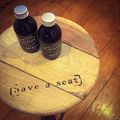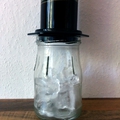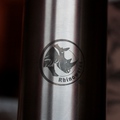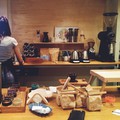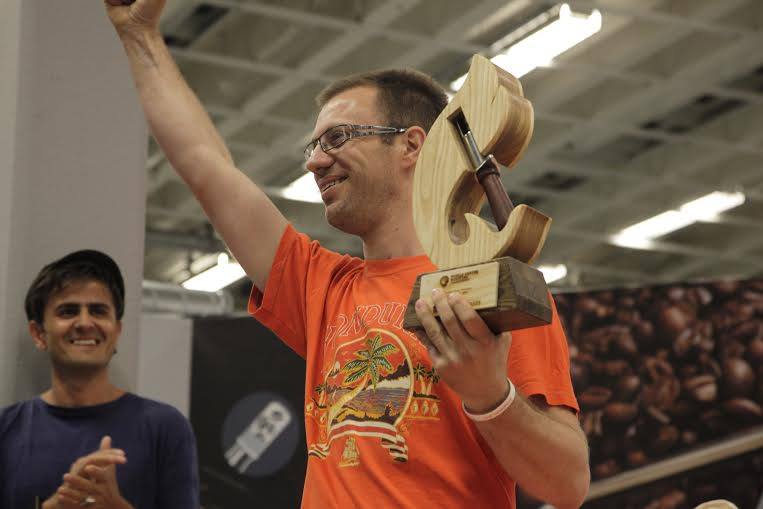
Home Brew Blog: Congratulations on your win at the World Roasting Championship! First of all, how did you get started working in coffee business?
Audun Sørbotten: I was working as a research scientist, a chemist, when my passion for coffee started. I read everything about coffee, blogged about coffee and even went to Trieste to cheer for Tim Wendelboe in the World Barista Championship in 2004. I came to know people at Solberg&Hansen. When my research money ran out, I decided to take the big leap from science to coffee. A position at Solberg&Hansen as a roaster was announced, I applied, and I got it! That was huge luck, since I believe that no place could be better for learning about coffee than at Solberg&Hansen.
So, did you learn to roast at Solberg&Hansen?
I learned to use the machines at Solberg&Hansen, and to work professionally with coffee. My systematical approach comes from my science background. I like to isolate parameters and investigate them. My chemistry background helps me to see that using chemistry to develop roasting theories leads basically nowhere. A roaster should have a purely practical approach; roasting is a hand craft. But the real knowledge is in coffee tasting. A good coffee roaster must taste everything, and do this for years. Every roast should be cupped. And if you can take this back to the machine and make coffee better and better, or consistently good -then you´re good at it!
What made you decide to open a coffee-roasting company? What does Norwegian roast mean?
I think that in most professions, when you work for others and become good at something, you should seriously consider starting your own business. I had this dream for years. I finally got the self-confidence after roasting some winning competition coffees (Nordic Roaster 2011 and 2012). My great opportunity came when I realized that Poland is in the very beginning of something really great when it comes to coffee. My wife is polish, so I wanted to go to Poland and start something that for me is the ideal company. «Norwegian Roast» is something I can stand behind after roasting a high percentage of Norway´s specialty coffee for 8 years. Every roasting company says practically the same things about themselves -that they have unique coffees that are skillfully hand-roasted etc.etc., so I wanted to come up with something new, something people could discuss.
Is roasting coffee an art or a science? Do you have a philosophy behind the coffees you develop? What’s your roasting philosophy?
I want to talk about the different ways you can be good at cupping coffee. You can be more or less good at any of them, but I know no one who are experts in all these fields. Number 1 is DESCRIPTIVE CUPPING, the ability to describe what you taste. Some are brilliant at this, but most people need to practice together with others to become better at it. Being good at descriptive cupping has high status. The second one is PURCHASE CUPPING, the ability to see which coffees are good, which are bad, and tell why. This is what we do when we buy from a selection of green coffees, and this is what we do when we cup any table with different coffees. It takes practice to see which coffees are true quality, and which coffees are of lesser quality. Green coffee buyers need to be good at this. The third skill is for the coffee roasters: PRODUCTION CUPPING. This is when you take a coffee you already bought, you roast it, and you need to determine if it can become better, which things are worth highlighting in this particular coffee and how you can try to improve it. There is actually a fourth cupping skill, and that is COMPETITION CUPPING. It´s not much more than a very funny party game, really. But it tests who can find cup differences under time pressure and being watched by an audience. There is absolutely no link between these four skills, even though many people believe so. You can be the best green coffee buyer in the world, and suck at competition cupping. Or you can be a great descriptive upper, but have no clue about how -or if- a coffee can be roasted better.
So, I think that roasting coffee is mostly about developing the different coffee cupping skills, and most of all the PRODUCTION CUPPING skill. This is neither art nor science, it´s more about getting experience. Operating a roasting machine is a hand craft, but not a very difficult one.
When I roast coffee I have different roast parameters for every bean type. These are based on experience about what usually works fine. And I have an idea about which roast color range I should hit for every coffee. So first I try to do this as accurately as possible, and then I cup the coffee and try to see what can be improved. Usually, something can be tried to make it better. Sometimes I like to do this cupping by myself, in total concentration. But often it´s the best thing to be a team of cuppers, and discuss the flavor and the potential of the coffee.
As you can see, I don´t have much of a roast philosophy. It´s mostly a very practical approach.
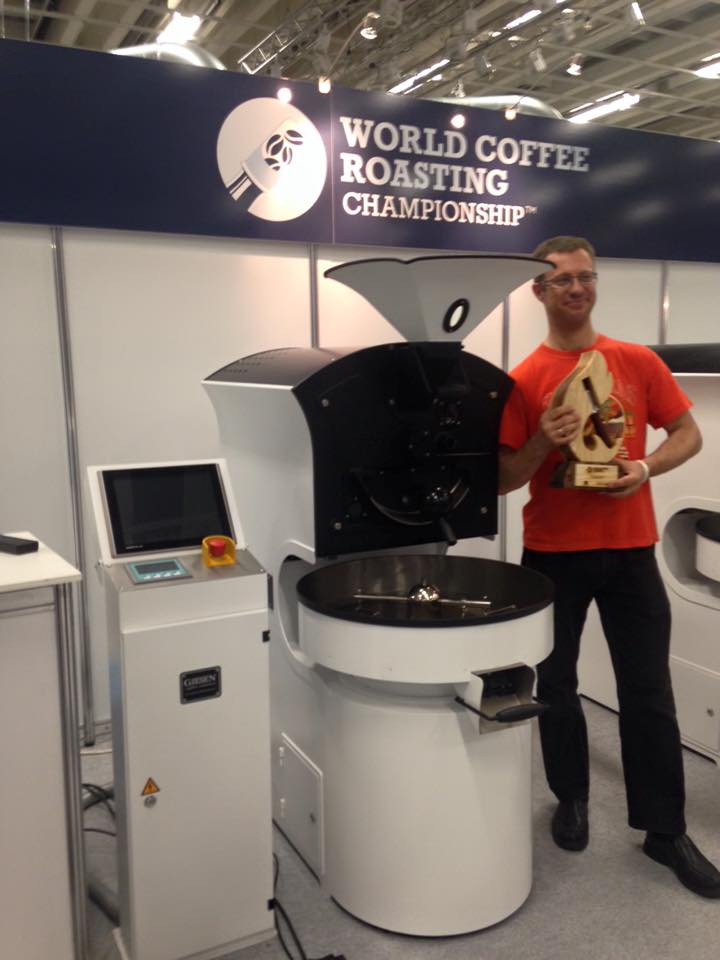
What's your favorite part of roasting coffee? Is there something special you’re looking for when you select your green beans or during the cupping?
My favorite thing is to shut down the machine for the day, get into a calm mood, and start to prepare for cupping. Then I feel good. I like coffees that are very clean and balanced, and with a lot of fruit or berry taste. I always cup till the coffee is close to room temperature, and then see if it´s still sweet, and without off-flavours or astringency.
What was your way to the World Coffee Roasting Championship?
Well, first of all I have two 2nd places in the Norwegian Championship, so I felt it was my turn now. When I won, I had very little time before Gothenburg. But I had time to visit a roastery in Norway called Jacu, a great little company with very high quality production. They roast on a Giesen machine, so I wanted to prepare on that machine. And I´m happy I did, since I saw what´s different from the machines I have roasted on earlier.
Take us back to the final's day. How did it feel to win? What was the secret to your success?
My focus was not on winning, but to roast good coffee. And if you do so, then anything can happen, it could be 4th place or….1st place! Of course it felt fantastic to win, but I must admit that there was also a good part of RELIEF as well, since it would have felt bad to not have roasted good coffee. I roasted two good coffees, I think, and I had maximum score on planning the roasting. Planning of the roast curves and the timing of them was possible by comparing the test roasting we did to my own Probat machine. The most difficult thing was to plan the final temperature of the coffee. I found that hard, but I thought that the best shot I could have at it was to just take the 1st crack temperature -approximately 189 degrees on the sample roasting- and add 11 degrees for the Kenya coffee, since this is the situation on my own Probat. So the planned final temperature was 200 degrees. I found it to be slightly dark, so I roasted a second batch, which became the one I handed in to the judges.
There were many small tactical choices during the competition. How to make a blend. How to sample roast. How to describe the taste.
There was no real secret behind the victory, except to not fail at anything, and to not be disturbed by competitors and what they said about their own choices.
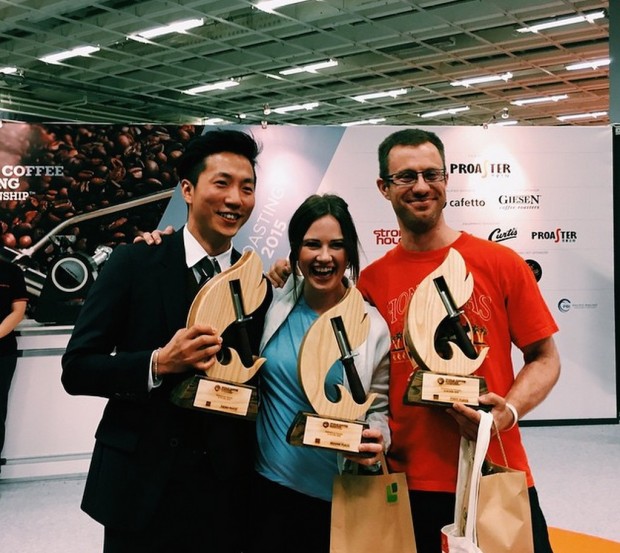
What was the most challenging part of the competition for you?
The most challenging part of the competition was the sample roasting on unknown sample roasting machines. And since we had just enough coffee to try each coffee ONCE there was no room for failure. I decided to roast slightly darker than I normally like it, since a slightly dark coffee has more information than a coffee roasted too light.
Can you recall the thrilling moment when you raised the final cup? What did you feel in that moment?
It felt a bit unreal. I realized in that moment that I actually just got a TITLE! I felt that now there will be opportunities opening up for me, I just don´t know which yet!
You are a Norwegian in Poland. It's unusual. When did you move to Poland? Do you like the country?
I moved here in August 2013. I love the country and the people here. I love the look of the cities. I´m interested in history, and Poland has got a lot of it!
Which coffee brewing method do you use at home? Why?
Mostly I make french press, Eva Solo and Norwegian style «kokekaffe» (coffee added to pre-boiled water in a kettle). All these methods are linked in taste. I make less and less filter coffee, since my good grinder is at work, and making bad extractions makes me nervous about the coffees I´ve sent to customers! I run back to my roastery and make cupping from my good grinder… and then I feel good again.
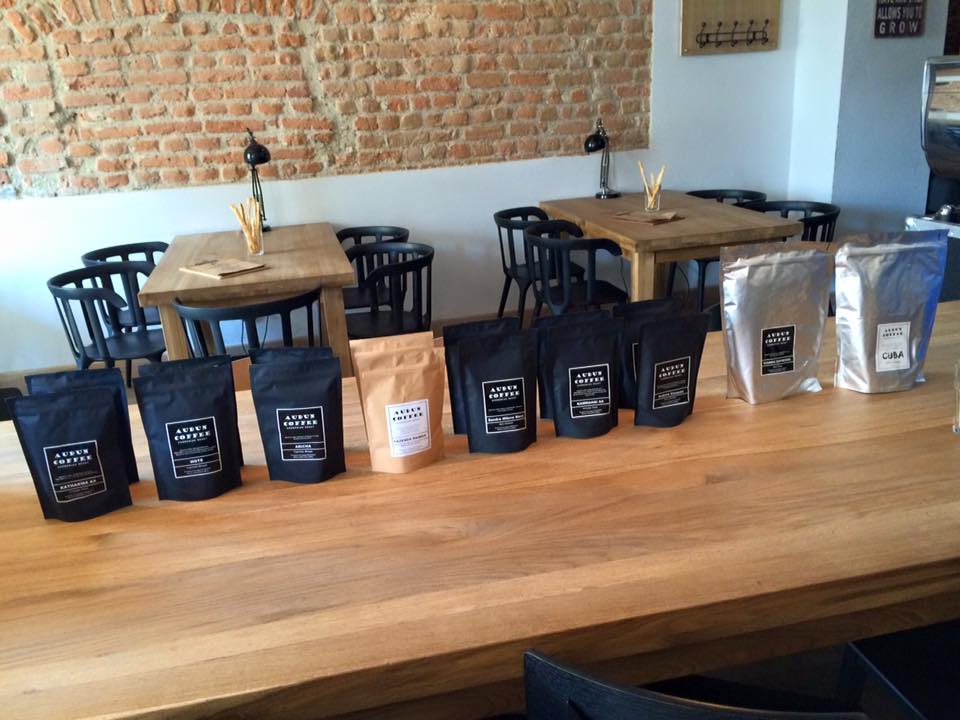
Your roastery has now been running for about 6 months. What’s next for Audun Coffee? Any plans you are willing to share?
I need to grow in volume. And when I reach a comfort level, I will open a concept cafe, which others can run for me. I´m not a barista or a cafe manager. I will import coffee myself when my volumes allow it. Most of all I will concentrate about always roasting well and choose good coffees.
What inspires you and keeps you passionate about coffee?
That is the coffee itself. I´m still amazed by what coffee can taste like, and how different coffees can fit into my needs and my life.
Audun Coffee - Norwegian Roast
Facebook: https://facebook.com/auduncoffee

